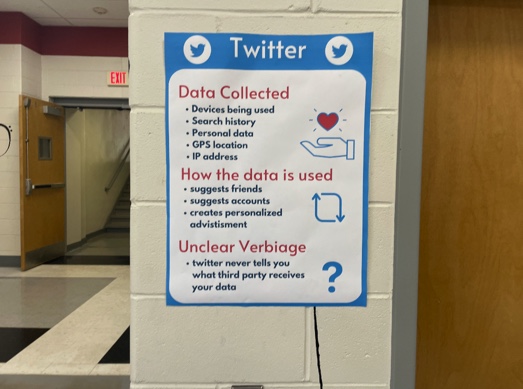
Social media is used by over half of the world, and it continues to spread rapidly. The grasp that social media has over the world allows the technology industry to take information from their users and sell it to third-party vendors for profit. The shady actions that these technology giants take are being done right under the public’s noses, but it is technically legal as they hide these plans within their terms of service. Bernard’s English teacher Mr. Pair is looking to “get [this] information” about their under-the-table actions “to as many people as he [can]” through the posters that his senior English classes have hung around the school.
Upon signing up for a new social media platform, everyone is prompted to read the terms of service and asked if they would like to accept them. When prompted, the majority of the people either scroll past them, not reading them or do not even open the terms of service. Either way, they accept them without knowing what they are agreeing to. Mr. Pair’s senior English classes had to read through the terms of service of various social media platforms, highlighting anything of concern within them. The students then used the information to design posters that, once complete, would be printed out, and hung around the school.
The posters created by the students reveal troublesome details about the true business that these various social media platforms do. For example, Twitter takes information that will help their users utilize their site, like name, email, and address book. The problems arise when one realizes that this is not all the information that Twitter takes. Twitter takes people’s IP address, location, memory, battery information, phone number, and apps used. What does a social media site need people’s battery info for?
Upon gathering information from people, social media moguls use the information in a backhanded way. These large companies make this information available to third parties, service providers, websites, and apps. Who are these third parties? These companies continually use the term “third parties” in their terms of service to referring to these vendors, but never specify who these “third parties” are. Why keep these third parties a secret?
Social media is taking over the world and is gaining more power. The way they are gaining this wealth and notoriety is through shady methods that exploit the user’s information for their own gain. They know that what they are doing is incorrect and protect themselves by hiding it in the vast pages of their terms of service that they know nobody reads. The posters spread throughout the school, exposing these platforms for their mistreatment of their users, behind the user’s backs.
The posters have spread the untrustworthiness of these platforms to students like Finn Traynor ‘23 who finds the information in the posters to be “shocking, disturbing, and scary,” being glad that “Mr. Pair made [him] aware.” These posters have opened up not only the eyes of students but also of teachers. Mr. Pair has seen “at least one staff member” that “immediately went and started changing their account settings” for Life360 after seeing one of the posters.
The actions of social media companies are not talked about enough. Yes, they provide entertainment for plenty, but the undercover stuff they do is too intrusive to be brushed under the rug. If no one talks about their actions, they will continue and intensify these actions, with no retribution. Mr. Pair revealed that the English department has expressed interest in continuing to spread the message that he started to share by potentially sending seniors down to the middle school to give a “TED talk” about this information in the foreseeable future. This would continue to carry the message to more and more people.












